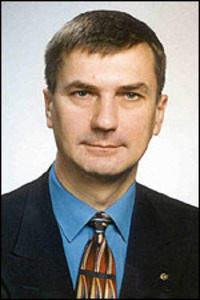Prime minister of Estonia: any Russian sanctions 'doomed to fail'

Russian boycott of Estonian goods was “doomed to fail” for many of Baltic county’s have a EU label, Estonia's prime minister said Thursday.
Andrus Ansip's comments came as Western support solidified behind the Baltic country, which remained at loggerheads with Moscow over the removal of a Soviet monument from downtown Tallinn.
Russian politicians and businessmen have called for a boycott of Estonian goods, and there have been reports of Russian grocery stores pulling Estonian-made products from their shelves.
"The call to boycott Estonian goods in Russia is doomed to fail as the goods sold there do not carry the label 'Made in Estonia,"' Andrus Ansip told reporters. Many goods produced in the 27-nation bloc have a "Made in the EU" label, he added.
The removal of the Bronze Soldier statue from a downtown Tallinn square to a military cemetery outside the city center triggered violent protests last week from Estonia's ethnic Russian minority.
Russians regard the memorial as a tribute to the millions of Soviet soldiers who died fighting Nazi Germany, but for many Estonians it is a bitter reminder of five decades of postwar Soviet occupation.
The dispute plunged Estonian-Russian relations to a new low, with Russian officials describing the move as "blasphemous" and "sacrilegious."
Russia's Foreign Minister Sergey Lavrov demanded immediate access to Russian citizens detained in Estonia during the troubles, in a phone conversation with his Estonian counterpart on Wednesday, the Interfax news agency reported.
The NATO alliance said Thursday it was "deeply concerned" about the safety of staff at the Estonian Embassy in Moscow, where pro-Kremlin activists have staged aggressive protests. NATO said the actions of the protesters were "unacceptable, and must be stopped immediately."
On Wednesday, the EU called on Russia to protect the Estonian Embassy while U.S. Deputy State Department spokesman Tom Casey said Estonian authorities were within their rights to move the monument from a downtown square to a military cemetery outside the city center.
"We have urged the Estonian and Russian governments to maintain dialogue and respect for the strong feelings on both sides," Casey said.
Estonia, which regained independence in 1991, joined the EU and NATO in 2004.
Prime Minister Ansip dismissed concerns that Russia would punish his country by interrupting Russian oil deliveries to Estonian transit ports, saying that would be more of a problem for Russia.
"The oil transit sector does not employ a lot of people, the number of possible job losses would be modest, and the impact to the government budget would be practically nonexistent," Ansip said.
He added that that around 80 percent of foreign investments to Estonia derive from Finland and Sweden, while Russia contributes a mere 2 percent to the figure.
Subscribe to Pravda.Ru Telegram channel, Facebook, RSS!


